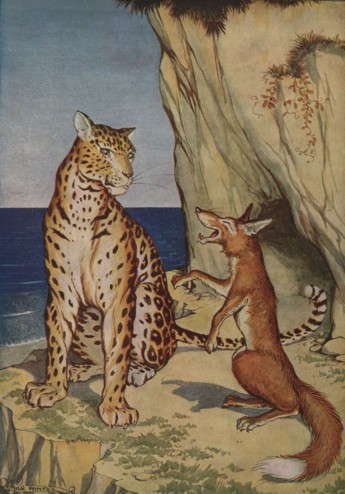Today's fable is Perry #12, the story of the debate between the fox and the leopard. At the Aesopus wiki, you can see a complete list of the versions of this fable that I have collected. This is one of the fables which enters the Latin tradition from its inclusion in the poems of Avianus, not Phaedrus. Unfortunately, however, this story was not one of the poems of Avianus which Steinhowel included in his edition of Aesop. As a result, it is not especially well-known in the Latin tradition, although it is a fine little story, with the fox reminding the leopard that beauty is only skin deep!
Here is a simple prose version from Clarke's reader:
Pardus, cui est pictum tergum, ceteris feris, etiam leonibus, despectis ab eo, intumescebat. Vulpecula accedit ad hunc, suadet non superbire, dicens illi quidem esse speciosam pellem, sibi vero esse speciosam mentem. Est discrimen et ordo bonorum: bona corporis praestant bonis fortunae, sed bona animi sunt praeferenda his.
Here is the version in Avianus, which is more elaborate, and builds up the leopard's sense of pride in greater detail:
Distinctus maculis et pulchro pectore, pardus
Inter consimiles ibat inire feras;
Sed quia nulla graves variarent terga leones,
Protinus his miserum credidit esse genus.
Cetera sordenti damnans animalia vultu
Solus in exemplum nobilitatis erat.
Hunc arguta novo gaudentem vulpis amictu
Corripit, et vanas approbat esse notas:
Vade, ait, et pictae nimium confide iuventae,
Dum mihi consilium pulchrius esse queat,
Miremurque magis quos munera mentis adornant,
Quam qui corporeis enituere bonis.
Here it is written out in segmented style to make it easier to follow, rearranging the Latin word as necessary to make the syntax more clear:
Pardus,
distinctus maculis et pulchro pectore,
ibat inire inter feras consimiles;
sed
quia variarent leones graves nulla terga,
protinus credidit
miserum esse his genus.
Damnans cetera animalia
sordenti vultu,
solus erat
in exemplum nobilitatis.
Hunc gaudentem novo amictu
arguta vulpis
corripit
et approbat
vanas esse notas;
ait:
Vade
et nimium confide pictae iuventae,
dum consilium mihi queat esse pulchrius,
et miremur magis
quos munera mentis adornant,
quam
qui corporeis enituere bonis.
When the leopard compares himself to the lions, he shows himself to be rather foolish, even before the fox sets him straight! I also like the alliteration of munera mentis, "the mental endowments" - I'm not quite sure how to get that same sense of alliteration in English - "brain bonanza" perhaps? And yes, the English word "bonanza" does ultimately derive from the Latin word bonus, via Spanish from a medieval Latin bonacia.
For an illustration, here is an image from Milo Winter's illustrations for Aesop's fables:

For more information about subscribing to this blog via RSS or by email, visit the Bestiaria Latina blog using the link provided here.
No comments:
Post a Comment